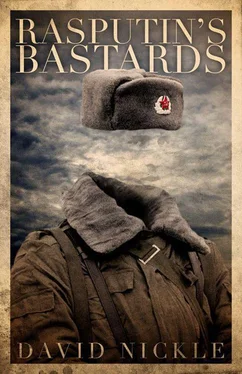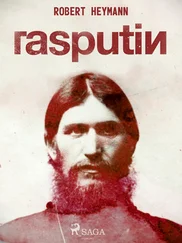Kolyokov drew a breath. So , he said to himself.
So. Can this be them? Can this be how they come?
Kolyokov stopped himself. There were no more answers to be had here in his bathyscaphe, uttering “byups” into the deep ocean. There was only one place to go — one thing to do now.
Kolyokov charted the old Soviet attack submarine’s course, and set his own course to intercept it.
The cloud sphere may have been impenetrable to him — but Kolyokov passed through the concentric hulls of the submarine like the ghost that he effectively was.
He emerged into a hallway barely wide enough for two men to pass each other, narrowed to nearly a crawlspace by barnacle clusters of unidentifiable electronic equipment bolted at irregular intervals along its walls and ceiling. The lights in the corridor were dim, widely spaced, and vaguely reddish. More light came from the cathode ray tubes and blinking green and red jewel-lights attached to the equipment.
When Kolyokov allowed himself to listen, he found there was conversation everywhere. He smiled to himself as that conversation resolved itself into the Discourse — a mental shorthand that he recognized immediately from his earliest days. In City 512.
They are here — thisistheshipment! he thought triumphantly — even as another part of him wondered at Shadak’s reckless decision to use a decommissioned Soviet submarine to deliver them. It wasn’t like Shadak to take this kind of risk; the Cold War may have been over for closing onto a decade, but that didn’t mean the Americans would have switched off their satellites and ended their surveillance of the waters off their east coast. Why not use a fishing trawler? A cruise ship? A zeppelin for that matter? Even that would have been less conspicuous.
Kolyokov settled himself against the bulkhead, and listened to the Discourse. It was difficult to tell immediately what was being said — these children were, after all, the product of a much later generation than Kolyokov. Their breeding would have honed them on every level. Their training would have too — except, of course, that their training would not have progressed very far, in the ruins that were left after Rodionov’s thugs shut down the program and left them all for dead.
Given such circumstances, Kolyokov was filled with a kind of familial pride, at the speed with which the Discourse played out. Why, it proceeded so quickly that he couldn’t even tell for sure how many participants were engaged.
If only he could figure out what it was they were all saying to one another. Kolyokov pushed his pride down and listened — still feeling for all the world like a doddering retiree, trying to keep up with his toddler grandchildren during an afternoon at the beach.
Discourse would confound even a young man, of course. In its purest form, the conversation between properly attuned minds was like the chatter between computer modems — the 1s and 0s in the memory of a computer. But the computers — the processors — were minds. The talk of those minds would be nonsensical to anyone — but tremendously quick, an immensely powerful way to communicate.
The only way to access that communication — the images and thoughts and sensations that it communicated — was through a filter.
A metaphor — like the bathyscaphe. But in this matter, Kolyokov had long ago found that a simpler idea did the job.
The metaphorical pen Kolyokov had placed in his hand scratched across the metaphorical pad he had placed on his lap. He divided the page into columns. In the first column was a list of all the names he could derive from context of the Discourse. In the second column, a record of that context. So when one of the participants referred to Vladimir in the midst of a long string of images — of numbers and instrument panels and a thin-faced man in a navy blue jersey — Kolyokov would write down Vladimir . In the column next to it, he would record those images and ideas: numbers and instrument panels and the face of the man, with a kind of photographic accuracy only possible in the field of metaphor. He would do the same for Vanya and Olga and Doonya — and more numbers and ideas and faces, waiting until he had enough information to form a picture, discern the meaning of this accelerated dialect of Discourse… .
And then, abruptly, he stopped.
Next to Olga, he had written only one thing. A face that he recognized all too well. Black hair, one thick eyebrow crossing two small, squinting eyes; a wide-jawed, vaguely handsome face marred mainly by those dull eyes, the unimaginative cast of his mouth.
It was Kilodovich. Alexei Kilodovich. Kolyokov’s lost sleeper. The prize in this whole sordid exchange.
What are you doing here ? he said to himself.
“What are you doing here?”
Kolyokov started at the words, and the metaphor of notebook and pen vanished. He turned, and stared wonderingly at the child who stepped through the hatchway behind him.
She was tiny — not much more than two feet tall. Her black hair was short and baby-fine, and her fingers were small and weak — an infant’s. When she walked, it was with the halting, uncertain clomping of a baby, still mastering the balance of her inner ear. She even wore a baby’s red sleeper.
God , thought Kolyokov. She was so tiny, in so many ways so like an infant… and yet not at all like one. Not with those eyes.
“Well?” said the girl.
Kolyokov drifted toward her. “Which one are you?” he asked, wonder in his voice. “Little Olga? Doonya?”
The girl stepped back from him, as though she feared his touch. “Say what you’re doing here,” she said to him.
“I have come—” Kolyokov considered, assembled his thoughts to go with his words “—I have come to take you to a very good place. Where you will have all the wonderful food you can eat, and play wonderful games all of the time. No one will be cross with you ever again.”
“Oh,” said the girl. She stopped, her back against a black box twice as tall as she. “You are Fyodor Kolyokov, yes?”
“Yes,” he said.
Kolyokov drifted closer to her still. He could see her eyes now — they were brown, but so dark a brown as to be almost black. It was a marker for them, those black eyes.
Incredible , he thought. This one must be among the youngest to come from City 512; untrained, but so very, very potent. Had she been the one who made the cloud sphere? He wondered. He wouldn’t have doubted it.
“Vladimir,” said the girl. It was the first time she spoke — all her other words had been thought. Her mouth opened wide around the word — wide as a great, red cavern, with nubs of new baby teeth sticking from the damp floor and ceiling. “Vladimir says Fyodor Kolyokov is a big bastard who I should not hesitate to eat if he is stupid enough to return.”
“Eat?”
The little girl didn’t answer. Her cavernous mouth simply closed tight around him, and the submarine — and everything else in the physical world — vanished for Fyodor Kolyokov.
The isolation tank was too well insulated for the sound of his sloshing and pounding and screaming to be heard beyond its confines. The sound baffling would quiet a bomb; it would be nothing for it to silence the death throes of a weak old man.
Desperately, he fumbled for the handle of the hatchway to let himself out. It should have been right above his head. Kolyokov’s hand grasped about for it, but at every turn, he found himself holding empty air. Although he knew it would do him no good, Kolyokov screamed again: “Get me out! Stephen! Get me out of here! It’s gone to hell! Everything’s screwed!”
Kolyokov turned himself over, lowered his knees to touch the bottom of the tank so he could at least orient himself. But his legs kept going, and when they eventually straightened there was still no bottom for even his toes to touch; only the warm brine that smelled so distinctly of Kolyokov. Swearing to himself, Kolyokov began to tread that water.
Читать дальше












